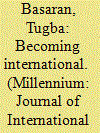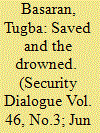|
|
|
Sort Order |
|
|
|
Items / Page
|
|
|
|
|
|
|
| Srl | Item |
| 1 |
ID:
157590


|
|
|
|
|
| Summary/Abstract |
The ‘international’ can be conceived of as a highly sought after symbolic capital. People seek to internationalise their curriculum vitae or resumes, study international subjects, get international diplomas, travel internationally, obtain international jobs. As symbolic capital the ‘international’ can be converted into ‘profit’ complementing other forms of capital (economic, cultural and social capital), deployed in struggles for social domination. It is used as a strategy of social positioning and social domination quasi-globally, but it is not recognised everywhere in the same way. We are particularly interested in the unequal distribution of this symbolic capital, the way differential conversion rates and social boundaries operate in the generation of social inequalities. For this, we will work with and against Bourdieu, in analysing the ‘international’ as a source of a highly contextual form of symbolic power, deployed in a variety of social group formations, but with uneven, differential effects, a naturalised and disguised form of domination. Ultimately, this article problematises how claims to ‘internationality’ operate in social relations and power-struggles and provides an analytical framework hereof.
|
|
|
|
|
|
|
|
|
|
|
|
|
|
|
|
| 2 |
ID:
139411


|
|
|
|
|
| Summary/Abstract |
The duty to render assistance at sea appears to be a well-established humanitarian norm; nonetheless, in 2011 alone more than 1500 people drowned in the Mediterranean. Witnesses recount that many could have been rescued if fellow seafarers had not ignored their pleas for help. Struggling to understand failures to rescue, many seek to portray indifference as individual failure from the norm. In contrast hereto, this article provides an insight into the governing of indifference in contemporary liberal societies - that is, how people are guided towards becoming indifferent to the lives and sufferings of particular populations. Thus, my focus will be on the workings of law and its potential to produce collective indifference. The drowned, I argue, are not casualties of individual immoral behaviour; through a system of sanctions, fellow human beings are encouraged to look away and even to let people die at borders in the name of security. This not only dilutes the legal duty to rescue but has also had a detrimental impact upon the normative landscape, leading to a distinction between worthy lives that fall within the duty to rescue and charitable lives becoming a question of benevolence.
|
|
|
|
|
|
|
|
|
|
|
|
|
|
|
|
| 3 |
ID:
085595


|
|
|
|
|
| Publication |
2008.
|
| Summary/Abstract |
Politics of borders and the distinction between inside/outside have become an important security practice of liberal states. Borders are strategically used to change the balance between security and liberties. This article analyzes the legal constitution of border zones and argues that security is not exceptional in its constitution but results from ordinary law and practices. Illiberal practices at border zones are embedded in ordinary politics of the liberal state.
|
|
|
|
|
|
|
|
|
|
|
|
|
|
|
|
|
|
|
|
|